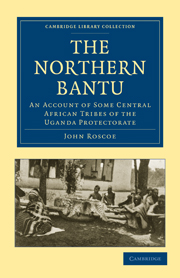Book contents
- Frontmatter
- PREFACE
- Contents
- LIST OF ILLUSTRATIONS
- Uganda and British East Africa
- PART I THE BANYORO A PASTORAL PEOPLE
- CHAP. I THE COUNTRY, THE PEOPLE, THE KING
- CHAP. II GOVERNMENT
- CHAP. III CLANS, TOTEMS AND TERMS OF RELATIONSHIP
- CHAP. IV MARRIAGE AND BIRTH
- CHAP. V SICKNESS AND DEATH
- CHAP. VI INDUSTRIES
- CHAP. VII WARFARE
- CHAP. VIII HUNTING, DRUMS AND THEIR USE
- CHAP. IX RELIGIOUS BELIEFS
- PART II THE BANYANKOLE A PASTORAL TRIBE OF ANKOLE
- PART III THE BAKENE, LAKE DWELLERS
- PART IV THE BAGESU A CANNIBAL TRIBE
- PART V THE BASOGA
- PART VI NILOTIC TRIBES. THE BATESO AND THE KAVIRONDO
- INDEX
- PUBLICATIONS OF THE CAMBRIDGE UNIVERSITY PRESS RELATING TO AFRICA
- Plate section
- Frontmatter
- PREFACE
- Contents
- LIST OF ILLUSTRATIONS
- Uganda and British East Africa
- PART I THE BANYORO A PASTORAL PEOPLE
- CHAP. I THE COUNTRY, THE PEOPLE, THE KING
- CHAP. II GOVERNMENT
- CHAP. III CLANS, TOTEMS AND TERMS OF RELATIONSHIP
- CHAP. IV MARRIAGE AND BIRTH
- CHAP. V SICKNESS AND DEATH
- CHAP. VI INDUSTRIES
- CHAP. VII WARFARE
- CHAP. VIII HUNTING, DRUMS AND THEIR USE
- CHAP. IX RELIGIOUS BELIEFS
- PART II THE BANYANKOLE A PASTORAL TRIBE OF ANKOLE
- PART III THE BAKENE, LAKE DWELLERS
- PART IV THE BAGESU A CANNIBAL TRIBE
- PART V THE BASOGA
- PART VI NILOTIC TRIBES. THE BATESO AND THE KAVIRONDO
- INDEX
- PUBLICATIONS OF THE CAMBRIDGE UNIVERSITY PRESS RELATING TO AFRICA
- Plate section
Summary
Cow-keeping. The chief industry of the Banyoro has always been cow-keeping: in this occupation all classes of people may take part without any feeling of loss of prestige in the eyes of the nation. In the ranks of herdsmen princes and men of mean birth may alike be found; whereas no prince nor indeed any poor person from the pastoral clans would willingly take any part in building, and they carefully avoid all agricultural pursuits. The king owns the largest number of cattle in the country, though some of the wealthy chiefs also own large herds. In addition to the sacred herd which is reserved solely for his own use, the king has many large herds which are kept in different parts of the country and from these cows are brought to the royal residence to supply milk for the king's wives and household. The cows are divided into herds according to their colour, each herd being kept apart from other herds which differ in this respect, because, in breeding, colour is the chief feature looked to. Little regard is paid to the breed of cows which give the most milk: if a cow is good in rearing her calves, and especially if she gives birth to cowcalves, she is considered to be a good one; whereas a cow that has bull-calves is not liked so well, even though she gives a better supply of milk.
- Type
- Chapter
- Information
- The Northern BantuAn Account of Some Central African Tribes of the Uganda Protectorate, pp. 62 - 80Publisher: Cambridge University PressPrint publication year: 2010First published in: 1915



